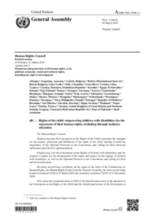This Resolution on empowering children with disabilities for the enjoyment of their human rights was adopted by the UN Human Rights Council on 22 March 2019. In the Resolution, the Human Rights Council:
1. Welcomes the report of the United Nations High Commissioner for Human Rights entitled “Empowering children with disabilities, including through inclusive education”;
2. Urges States to take all measures necessary to ensure the full enjoyment by children with disabilities of all human rights and fundamental freedoms on an equal basis with other children, without discrimination of any kind;
3. Calls upon States to ensure that in all actions concerning children with disabilities, including those with multiple impairments, the best interests of the child shall be a primary consideration, including when defining the legal framework, decision-making processes, implementation of policies and programmes and provision of services and covering all aspects of care, support and protection in all settings.
The Human Rights Council also notes its concern in this Resolution "that children with disabilities, in particular girls with disabilities, are often at greater risk, both within and outside the home, including in institutions, of stigmatization, discrimination or exclusion and are disproportionally subjected to violence, injury or abuse, neglect or negligent treatment, maltreatment or exploitation, including sexual and gender-based violence," and reaffirms "that the child, for the full and harmonious development of his or her personality, should grow up in a family environment, that the best interests of the child shall be the guiding principle of those responsible for his or her nurture and protection, and that families’ and caregivers’ capacities to provide the child with care and a safe environment should be promoted." The Human Rights Council also states in the Resolution that it is "deeply concerned that children with disabilities are particularly vulnerable to institutionalization on the basis of impairment, and are separated from their families and placed in institutions."
Some of the key care-related sections of this Resolution include the following paragraphs:
11. Calls upon States to take all appropriate measures, ensuring these are age, gender and disability sensitive, to protect children with disabilities, both within and outside the home, including in institutions, from all forms of exploitation, violence and abuse, including emotional, verbal and physical abuse, sexual and gender-based violence, harassment, discriminatory social norms and harmful practices, female genital mutilation, child, early and forced marriage, forced or coercive medical procedures, bullying and cyberbullying, and other crimes such as trafficking and smuggling;
16. Urges States to provide early and comprehensive information, services and support to children with disabilities and their families with a view to preventing concealment, abandonment, neglect and segregation and to ensuring they have equal rights with respect to family life, and in this regard encourages States to replace institutionalization with appropriate measures to support family and community-based services and, where the immediate family is unable to care for a child with disabilities, undertake every effort to provide alternative care within the wider family and, failing that, within the community in a family setting, bearing in mind the best interests of the child and taking into account the child’s will and preferences;

